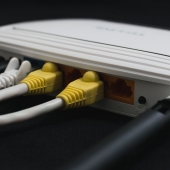-
HP fixes severe bug in pre-installed Support Assistant tool
HP issued a security advisory alerting users about a newly discovered vulnerability in HP Support Assistant, a software tool that comes pre-installed on all HP laptops and desktop computers, including the Omen sub-brand.
- September 07, 2022
- 02:06 PM
 0
0
-
Anker Eufy smart home hubs exposed to RCE attacks by critical flaw
Anker's central smart home device hub, Eufy Homebase 2, was vulnerable to three vulnerabilities, one of which is a critical remote code execution (RCE) flaw.
- June 16, 2022
- 01:38 PM
 0
0
-
New PACMAN hardware attack targets Macs with Apple M1 CPUs
A new hardware attack targeting Pointer Authentication in Apple M1 CPUs with speculative execution enables attackers to gain arbitrary code execution on Mac systems.
- June 10, 2022
- 03:15 PM
 0
0
-
NVIDIA has open-sourced its Linux GPU kernel drivers
NVIDIA has published the source code of its kernel modules for the R515 driver, using a dual licensing model that combines the GPL and MIT licenses, making the modules legally re-distributable.
- May 12, 2022
- 10:31 AM
 1
1
-
Cisco vulnerability lets hackers craft their own login credentials
Cisco has released a security advisory to warn about a critical vulnerability (CVSS v3 score: 10.0), tracked as CVE-2022-20695, impacting the Wireless LAN Controller (WLC) software.
- April 15, 2022
- 01:54 PM
 0
0
-
AMD confirms GPU driver bug overclocks CPUs without permission
AMD is investigating an issue in its GPU software suite that causes an auto-adjustment of AMD Ryzen CPU performance settings for users without permission.
- April 06, 2022
- 09:53 AM
 0
0
-
Western Digital My Cloud OS update fixes critical vulnerability
Western Digital has released new My Cloud OS firmware to fix a vulnerability exploited by bug hunters during the Pwn2Own 2021 hacking competition to achieve remote code execution.
- March 24, 2022
- 05:47 PM
 0
0
-
HP patches 16 UEFI firmware bugs allowing stealthy malware infections
HP has disclosed 16 high-impact UEFI firmware vulnerabilities that could allow threat actors to infect devices with malware that gain high privileges and remain undetectable by installed security software.
- March 08, 2022
- 01:00 PM
 0
0
-
QNAP force-installs update after DeadBolt ransomware hits 3,600 devices
QNAP force-updated customer's Network Attached Storage (NAS) devices with firmware containing the latest security updates to protect against the DeadBolt ransomware, which has already encrypted over 3,600 devices.
- January 28, 2022
- 01:30 AM
 0
0
-
Hundreds of thousands of MikroTik devices still vulnerable to botnets
Approximately 300,000 MikroTik routers are vulnerable to critical vulnerabilities that malware botnets can exploit for cryptomining and DDoS attacks.
- December 09, 2021
- 06:00 AM
 1
1
-
Nine WiFi routers used by millions were vulnerable to 226 flaws
Security researchers analyzed nine popular WiFi routers and found a total of 226 potential vulnerabilities in them, even when running the latest firmware.
- December 02, 2021
- 09:30 AM
 5
5
-
New Rowhammer technique bypasses existing DDR4 memory defenses
Researchers have developed a new fuzzing-based technique called 'Blacksmith' that revives Rowhammer vulnerability attacks against modern DRAM devices that bypasses existing mitigations.
- November 15, 2021
- 05:27 PM
 0
0
-
High severity BIOS flaws affect numerous Intel processors
Intel has released an advisory to confirm the existence of two high-severity vulnerabilities that affect a wide range of Intel processor families.
- November 15, 2021
- 12:15 PM
 2
2
-
Samsung sued for flawed Chromebook hinges cracking displays
Samsung is being sued for selling the Samsung Chromebook Plus 2-in-1 even though they allegedly knew for years of a defect that caused displays to break.
- November 06, 2021
- 11:36 AM
 1
1
-
Canon sued for disabling scanner when printers run out of ink
Canon USA is being sued for not allowing owners of certain printers to use the scanner or faxing functions if they run out of ink.
- October 16, 2021
- 10:28 AM
 53
53
-
AMD warns of up to 15% Windows 11 performance decrease
AMD says it observed performance hits of up to 15% on Windows 11-compatible AMD processors when using some applications.
- October 07, 2021
- 12:17 PM
 9
9
-
Western Digital confirms speed crippling SN550 SSD flash change
Western Digital has confirmed that it changed the NAND flash memory in one of its most popular M.2 NVMe SSD models, the WD Blue SN550, which crippled writing speeds according to several reports, leading to a 50% performance hit.
- August 26, 2021
- 01:17 PM
 1
1
-
New ASUS BIOS updates enable TPM 2.0 support for Windows 11
ASUS has released BIOS updates for over two hundred motherboard models to automatically enable the built-in TPM 2.0 security process so that users can upgrade to Windows 11.
- August 09, 2021
- 12:49 PM
 10
10
-
Hackers use zero-day to mass-wipe My Book Live devices
A zero-day vulnerability in Western Digital My Book Live NAS devices allowed a threat actor to perform mass-factory resets of devices last week, leading to data loss.
- June 29, 2021
- 05:28 PM
 2
2
-
WhyNotWin11 is a better replacement for Windows 11's PC Health Check
An open-source application called WhyNotWin11 acts as a better drop-in replacement for Microsoft's PC Health Check app to determine if your hardware is compatible with Windows 11.
- June 26, 2021
- 02:55 PM
 13
13


 0
0
























